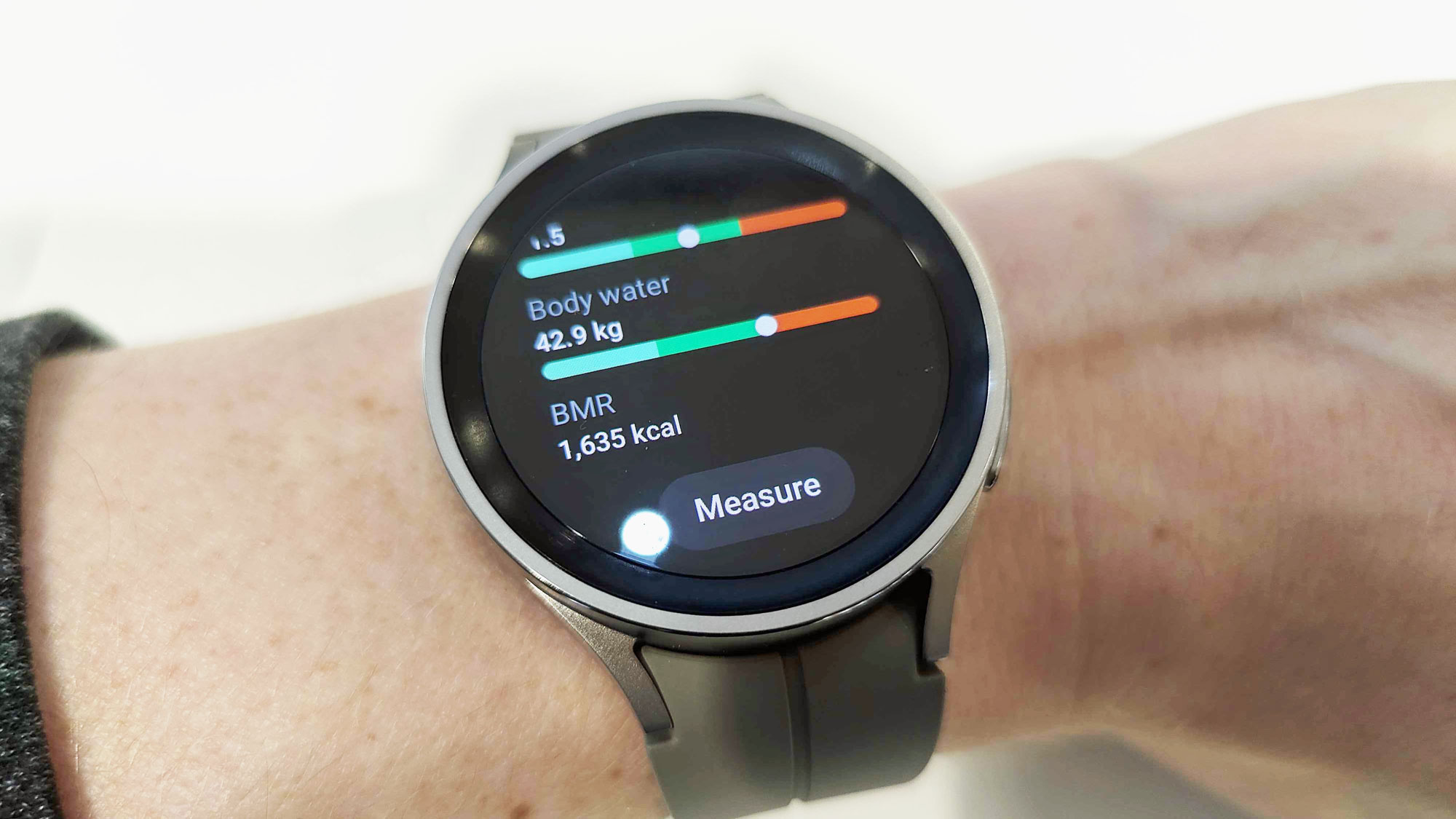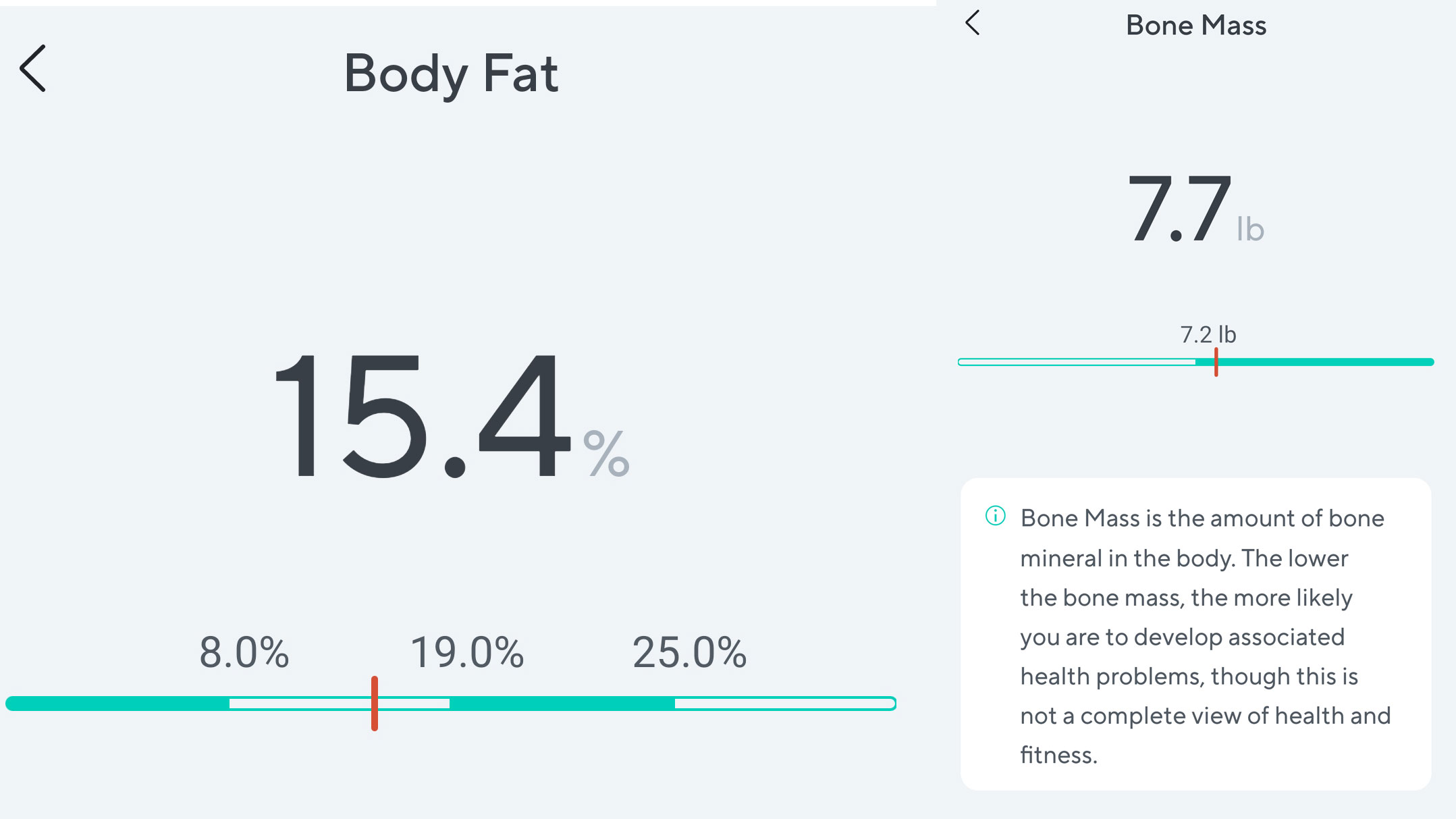My favorite Samsung Galaxy Watch feature is fast, accurate and missing from Apple Watch
The Galaxy Watch 5 Pro’s body composition analysis is surprisingly accurate

I’m currently testing the Samsung Galaxy Watch 5 Pro, Samsung’s latest premium wearable, and it’s got a bit of an identity crisis. With one foot in true smartwatch territory, Samsung is also aiming squarely at the best running watches, with advanced GPS and route navigation software, a raised bezel and tough casing to protect the screen on your adventures, and other prominent health features.
One notable advance for Samsung, first introduced in the Galaxy Watch 4, is the body composition tool. Further refined for the 5 and 5 Pro models, the Watch uses a process called ‘bioelectrical impedance analysis', or BIA, to measure the amount of body fat, muscle, bone and water in your body, checking these figures against the typical healthy ratios for your height and weight. It takes just seconds. Apple’s watches, even the new all-singing, all-dancing Apple Watch Ultra fitness tool, don’t even measure body composition.
BIA works by sending a small electrical current throughout your body. The current moves at different paces through bone, fat and muscle, so based on the speed of the current, the watch provides an estimation of how much of each you have in your body.
All smart scales operate in this way, sending the electrical current up through your feet into your body when you step on the scales. However, on the Samsung Galaxy Watch 5 Pro, you rest your middle and ring fingers against the Watch’s two buttons, which act as conductors to fire the electric current instead. Neat, right?
In the process of reviewing the Galaxy Watch 5 Pro, I tested this feature and got a few interesting metrics back. At 30 years old, 5’10” tall and 150lbs, my BMI stands at around 21.5, so I’ve got a good indication that I’m smack bang in the middle of the “healthy weight” range for my age, gender and height. According to the Samsung Galaxy Watch 5 Pro, my body fat percentage is 13.4%, and my basal metabolic rate—the number of calories I burn to perform basic, life-sustaining functions in a day—is 1,635 calories.

These are useful numbers to have for any fitness enthusiast. If you want to gain weight or lose weight, your basal metabolic rate is the number of calories your body chews up without taking movement into account. Want to gain weight? Eat more than this number and move less. Want to lose weight? Eat around this number of calories a day, and move more. The watch tells me other, less useful stats too, such as my body’s total water percentage (42.9%, if you’re curious).
However, just how accurate are these numbers? To someone who’s seeing these for the first time, there’s no way of knowing whether the watch is presenting an accurate picture of your health here. This is why I compared these figures to my last reading on the Wyze Scale X, a smart scale that also uses BIA by sending the current up through your feet, to see how the two compare and whether the watch’s information was accurate, or Samsung had just rushed another gimmick through R&D.
The two readings were surprisingly similar. The scale calculated my body fat percentage at 15.4%, a difference of 1.5%. Perhaps this difference isn't accurate enough for an elite athlete or professional bodybuilder, but plenty good enough for someone looking for a general representation of their health. My basal metabolic rate was calculated at 1,601 calories, a difference of just 34 calories there. Even my body’s water content came out similar, at 42.09%—a difference of just 0.1%.
It’s worth noting that BIA provides an estimation of your stats only, and it’s not intended for medical purposes. But the similarity between the two readings meant the Samsung Galaxy Watch 5 Pro is far more accurate than I thought it was going to be—like many people, I assumed it was a bit of a marketing gimmick, but I’m impressed at the similarities between the two readings.
Wyze is a trusted brand, and I’ve personally compared the scale against rivals like Eufy, so I’m satisfied it’s a good benchmark. If you’re looking for both a new fitness watch and one of the best smart scales, you might be able to save some money and kill two birds with one stone by picking up a Samsung Galaxy Watch 5, 5 Pro, or even the previous generation at a discounted price.
Get daily insight, inspiration and deals in your inbox
Sign up for breaking news, reviews, opinion, top tech deals, and more.

Matt is TechRadar's expert on all things fitness, wellness and wearable tech.
A former staffer at Men's Health, he holds a Master's Degree in journalism from Cardiff and has written for brands like Runner's World, Women's Health, Men's Fitness, LiveScience and Fit&Well on everything fitness tech, exercise, nutrition and mental wellbeing.
Matt's a keen runner, ex-kickboxer, not averse to the odd yoga flow, and insists everyone should stretch every morning. When he’s not training or writing about health and fitness, he can be found reading doorstop-thick fantasy books with lots of fictional maps in them.